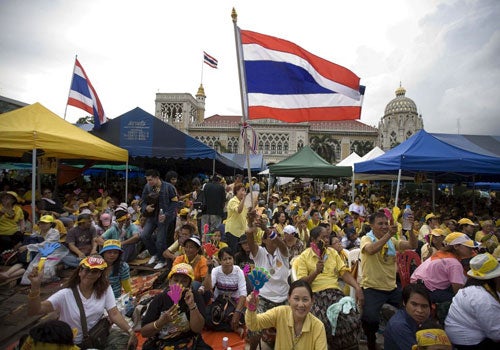State of emergency declared in Thailand

Your support helps us to tell the story
From reproductive rights to climate change to Big Tech, The Independent is on the ground when the story is developing. Whether it's investigating the financials of Elon Musk's pro-Trump PAC or producing our latest documentary, 'The A Word', which shines a light on the American women fighting for reproductive rights, we know how important it is to parse out the facts from the messaging.
At such a critical moment in US history, we need reporters on the ground. Your donation allows us to keep sending journalists to speak to both sides of the story.
The Independent is trusted by Americans across the entire political spectrum. And unlike many other quality news outlets, we choose not to lock Americans out of our reporting and analysis with paywalls. We believe quality journalism should be available to everyone, paid for by those who can afford it.
Your support makes all the difference.Troops were back on the streets of Bangkok today, two years after Thailand was plunged into turmoil by a military coup. But in a twist typical of labyrinthine Thai politics, the soldiers were summoned by the man who most fears an army takeover.
Prime Minister Samak Sundaravej declared a state of emergency after a week of anti-government demonstrations aimed at forcing him out turned violent. One man was killed and dozens of people were injured, several seriously, during clashes between protesters and government supporters.
Thousands of activists from the self-styled People’s Alliance for Democracy (PAD) have occupied the main government compound in Bangkok, erecting barricades of razor wire and car tyres. Riots erupted early today after supporters of Mr Samak took to the streets, vowing to drive them out of the complex. Gangs armed with sticks, knives and slingshots – and some firearms – then chased each other along the capital’s wide boulevards, setting upon anyone they caught.
Mr Samak, whose predecessor, Thaksin Shinawatra, was ousted in the 2006 coup, said the violence – the worst in Bangkok for more than a decade - had left him with no choice. “I did it to solve the problems of the country,” he said. “The softest means available was an emergency decree to end the situation, using the law. I did this to douse the fire, not to cause a fire.”
The Prime Minister’s opponents accuse him of being a frontman for Mr Thaksin, who has been living in exile in London, and fled back to England last month to avoid facing corruption charges. Mr Samak has led a six-party coalition since elections were held last December, ending a year of military rule.
Adding to Mr Samak’s woes, Thailand’s Election Commission recommended today that his People’s Power Party be disbanded, because of alleged vote-buying at the election. If the ruling is upheld, following a process expected to last months, the former Bangkok mayor and television chef could be banned from politics for five years.
The anti-government protests have caused havoc, temporarily shutting down three airports in the south last weekend and leaving foreign tourists stranded. Rail services were also affected, and a strike tomorrow could cause further transport disruptions, as well as power and water cuts. Hundreds of schools are planning to close for three days.
The capital is now controlled by the military, which must decide whether to swoop on the government complex. Protesters – many wearing yellow, the King’s colour - said they would not be moving despite the emergency decree. “There are not enough jails to put us all into,” said one PAD leader, Chamlong Srimuang.
Among those expressing defiance was 66-year-old Kaewta Singhasaenee, who clutched a bamboo rod and a helmet. “If they [the military] come, I won’t run,” she declared. “I love my country. I’m an old lady, but I’m strong.”
The military has been given powers to ban public gatherings and impose restrictions on media reports. But the chief of the army, General Anupong Paochinda, promised that troops would not use force to evict the demonstrators. Instead, he said, they would “improve understanding among Thais and make everyone aware that there can still be a peaceful solution through negotiations”.
Mr Paochinda, who took part in the 2006 military takeover, also dismissed speculation that the army was positioning itself to seize power again. “If the military uses force to stage a coup, it will create a lot more problems,” he said.
However, the deployment of troops in a country that has lived through 18 coups since 1932 makes many locals nervous. The key tourism industry will also suffer. South Korea and Singapore yesterday urged their citizens to avoid non-essential travel to Thailand, while Australia and Taiwan stressed the need for extra vigilance.
Join our commenting forum
Join thought-provoking conversations, follow other Independent readers and see their replies
Comments